七年级英语重要句型
七下英语句型
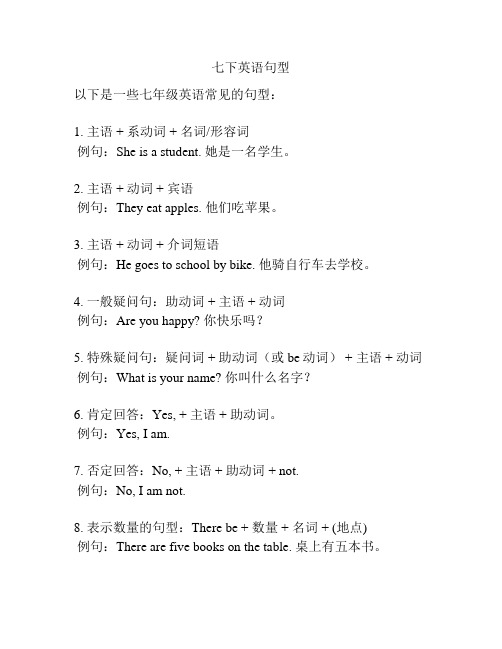
七下英语句型
以下是一些七年级英语常见的句型:
1. 主语 + 系动词 + 名词/形容词
例句:She is a student. 她是一名学生。
2. 主语 + 动词 + 宾语
例句:They eat apples. 他们吃苹果。
3. 主语 + 动词 + 介词短语
例句:He goes to school by bike. 他骑自行车去学校。
4. 一般疑问句:助动词 + 主语 + 动词
例句:Are you happy? 你快乐吗?
5. 特殊疑问句:疑问词 + 助动词(或be动词) + 主语 + 动词例句:What is your name? 你叫什么名字?
6. 肯定回答:Yes, + 主语 + 助动词。
例句:Yes, I am.
7. 否定回答:No, + 主语 + 助动词 + not.
例句:No, I am not.
8. 表示数量的句型:There be + 数量 + 名词 + (地点)
例句:There are five books on the table. 桌上有五本书。
9. 表示喜欢或讨厌的句型:I like/love/hate + 名词/动词 + (宾语)。
例句:I like swimming. 我喜欢游泳。
10. 表示能力或可能性的句型:Can + 主语 + 动词原形
例句:Can you speak English? 你会说英语吗?
这些句型可以用来构建各种类型的句子,帮助你在英语学习中表达自己的意思。
七年级上册英语全单元重点句型总结
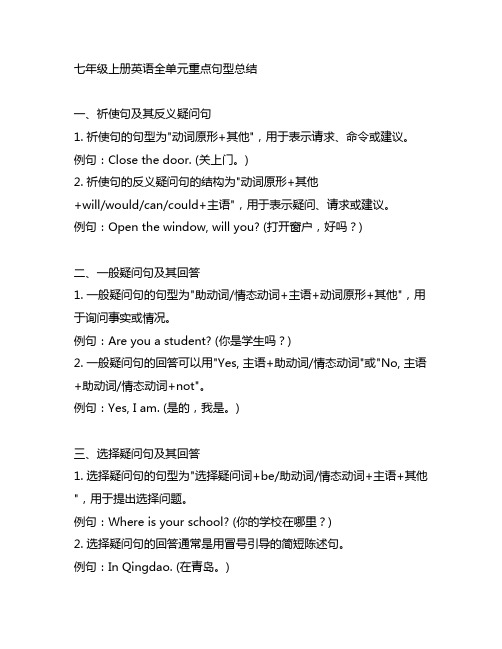
七年级上册英语全单元重点句型总结一、祈使句及其反义疑问句1. 祈使句的句型为"动词原形+其他",用于表示请求、命令或建议。
例句:Close the door. (关上门。
)2. 祈使句的反义疑问句的结构为"动词原形+其他+will/would/can/could+主语",用于表示疑问、请求或建议。
例句:Open the window, will you? (打开窗户,好吗?)二、一般疑问句及其回答1. 一般疑问句的句型为"助动词/情态动词+主语+动词原形+其他",用于询问事实或情况。
例句:Are you a student? (你是学生吗?)2. 一般疑问句的回答可以用"Yes, 主语+助动词/情态动词"或"No, 主语+助动词/情态动词+not"。
例句:Yes, I am. (是的,我是。
)三、选择疑问句及其回答1. 选择疑问句的句型为"选择疑问词+be/助动词/情态动词+主语+其他",用于提出选择问题。
例句:Where is your school? (你的学校在哪里?)2. 选择疑问句的回答通常是用冒号引导的简短陈述句。
例句:In Qingdao. (在青岛。
)四、特殊疑问句及其回答1. 特殊疑问句的句型为"特殊疑问词+be/助动词/情态动词+主语+其他",用于询问特殊信息。
例句:What's your name? (你叫什么名字?)2. 特殊疑问句的回答是根据问题的具体情况而定,通常是对问题的具体信息做出回答。
例句:My name is Tom. (我的名字叫汤姆。
)五、陈述句及其否定句1. 陈述句的句型为"主语+be/助动词/情态动词+其他",用于陈述事实、描述情况。
例句:She is from France. (她来自法国。
人教版七年级上册英语重点句型
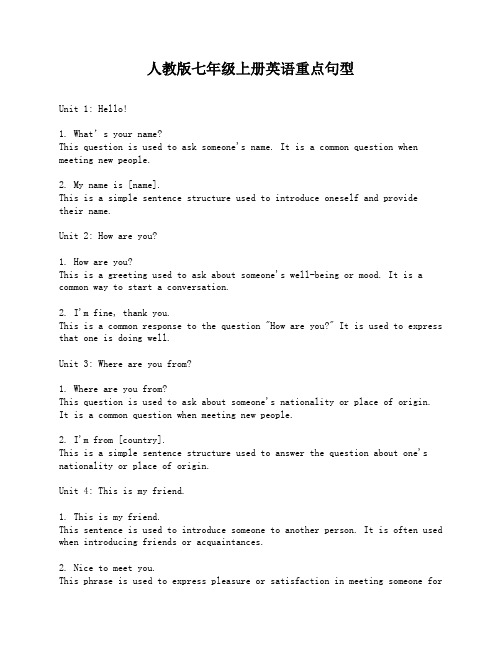
人教版七年级上册英语重点句型Unit 1: Hello!1. What’s your name?This question is used to ask someone's name. It is a common question when meeting new people.2. My name is [name].This is a simple sentence structure used to introduce oneself and providetheir name.Unit 2: How are you?1. How are you?This is a greeting used to ask about someone's well-being or mood. It is a common way to start a conversation.2. I'm fine, thank you.This is a common response to the question "How are you?" It is used to express that one is doing well.Unit 3: Where are you from?1. Where are you from?This question is used to ask about someone's nationality or place of origin. It is a common question when meeting new people.2. I'm from [country].This is a simple sentence structure used to answer the question about one's nationality or place of origin.Unit 4: This is my friend.1. This is my friend.This sentence is used to introduce someone to another person. It is often used when introducing friends or acquaintances.2. Nice to meet you.This phrase is used to express pleasure or satisfaction in meeting someone forthe first time. It is a polite way to greet someone.Unit 5: These are for you.1. These are for you.This sentence is used to present or give something to someone. It is often used when giving gifts or sharing items.2. Thank you.This is a common response when receiving something or being helped by someone. It is used to express gratitude.Unit 6: What's this in English?1. What's this in English?This question is used to ask for the English translation or name of an object. It is a common question when learning new vocabulary.2. It's a [object].This is a simple sentence structure used to provide the English translation or name of an object.Unit 7: Can you play the guitar?1. Can you [verb]?This question is used to ask someone if they are able to do a specific action or skill. It is a common way to inquire about someone's abilities or talents.2. Yes, I can.This response is used to confirm that one is able to do the action or skill mentioned in the question.Unit 8: I'd like some noodles.1. I'd like [food].This sentence is used to express one's desire for a specific type of food or drink. It is commonly used when ordering at a restaurant or cafe.2. Here you are.This phrase is used when giving something to someone. It is a polite way to hand over the requested item.Unit 9: What does he look like?1. What does he/she look like?This question is used to ask about someone's physical appearance. It is often used when describing or identifying someone.2. He/She has [physical feature].This sentence structure is used to describe someone's physical features such as hair color, eye color, or height.Unit 10: Can you help me?1. Can you help me?This question is used to ask someone for assistance or support. It is a polite way to request help from others.2. Of course/Yes, of course.These responses are used to indicate willingness and readiness to assist someone. They are a polite way to accept a request for help.。
七年级英语重点句型和短语

七年级英语重点句型和短语
以下是一些七年级英语重点句型和短语:
1. 句型:
- This is...(这是...)
- That is...(那是...)
- These are...(这些是...)
- Those are...(那些是...)
- I am...(我是...)
- You are...(你是...)
- He/She is...(他/她是...)
- It is...(它是...)
- We are...(我们是...)
- They are...(他们是...)
2. 短语:
- Good morning/afternoon/evening.(早上/下午/晚上好。
) - How are you?(你好吗?)
- Nice to meet you.(很高兴见到你。
)
- What's your name?(你叫什么名字?)
- Where are you from?(你来自哪里?)
- How old are you?(你多大了?)
- What's this/that in English?(这个/那个用英语怎么说?) - What color is it?(它是什么颜色?)
- What day is it today?(今天是星期几?)
- What's the weather like today?(今天天气怎么样?)
- Can you spell it, please?(请问你能拼写它吗?)
这些句型和短语是七年级英语学习的基础,掌握它们可以帮助学生更好地理解和运用英语。
当然,这只是其中的一部分,学生还需要不断学习和积累更多的英语知识。
人教版初一英语七年级全册(上下册)重点短语和句型

人教版初一英语七年级全册(上下册)重点短语和句型人教版初一英语七年级全册(上下册)重点短语和句型人教七年级(上册)Starter Units 1-31.早上好!Good morning!2.下午好!Good afternoon!3.晚上好!Good evening!4.——你好吗?—How are you?我很好,谢谢。
/我还不错。
—I'm fine。
thanks。
/ I'm OK.5.——这个/那个用英语怎么说?—What's this / that in English?是……—It's a / an。
6.请拼写它。
Spell it。
please.7.——它是什么颜色的?—What color is it? 它是……色的。
—It's。
Unit 1n A1.我是……I'm。
2.你是……吗?Are you。
3.他/她是……He / She is。
4.——见到你很高兴。
—Nice to meet you.见到你我也很高兴。
—Nice to meet you。
too.5.——你/他/她叫什么名字?—What's your / his / her name?我/他/她叫……—My / His / Her name is。
n B1.名字first name2.姓last name3.在中国in China4.学生卡ID card5.这是你的号码吗?Is this your number?6.——你的电话号码是多少?—What's your telephone / phone number?是……—It's。
Unit 2n A1.家庭照片family photos2.这是/那是/这些是/那些是……This is / That is / These are / Those are。
3.她/他是谁?Who's she / he?4.他们是谁?Who are they?5.祝你过得愉快!Have a good day!6.我知道了。
七年级英语重点短语与句型
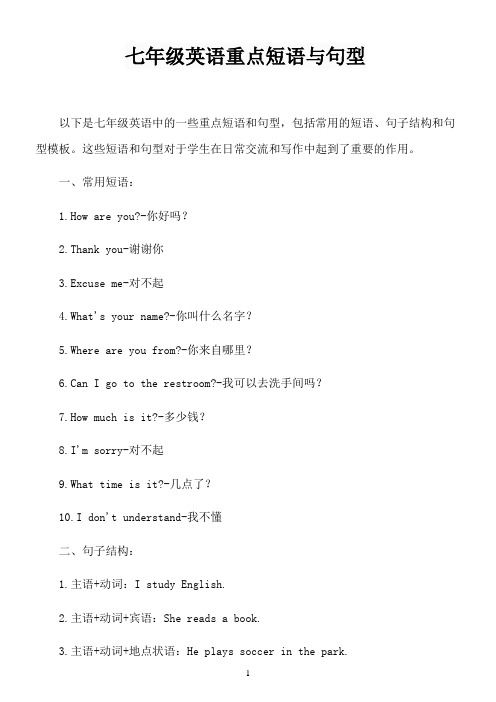
七年级英语重点短语与句型以下是七年级英语中的一些重点短语和句型,包括常用的短语、句子结构和句型模板。
这些短语和句型对于学生在日常交流和写作中起到了重要的作用。
一、常用短语:1.How are you?-你好吗?2.Thank you-谢谢你3.Excuse me-对不起4.What's your name?-你叫什么名字?5.Where are you from?-你来自哪里?6.Can I go to the restroom?-我可以去洗手间吗?7.How much is it?-多少钱?8.I'm sorry-对不起9.What time is it?-几点了?10.I don't understand-我不懂二、句子结构:1.主语+动词:I study English.2.主语+动词+宾语:She reads a book.3.主语+动词+地点状语:He plays soccer in the park.4.主语+动词+时间状语:We have class at 8 o'clock.5.主语+动词+宾语+地点状语:They eat dinner at home.三、句型模板:1.What+be+主语+like?-询问某人的外貌或性格特征。
Example:What is your sister like?-你妹妹长什么样?2.Can+主语+动词原形?-提出请求或询问能力。
Example:Can you help me?-你能帮我吗?3.How+be+主语?-询问某人的状态或感觉。
Example:How are you?-你好吗?4.What+do+主语+like?-询问某人的爱好或喜欢的事物。
Example:What does she like to do?-她喜欢做什么?5.Why+do/does+主语+动词原形?-询问原因或理由。
Example:Why do they go to the park?-他们为什么去公园?通过以上的短语和句型,学生可以在日常交流和写作中灵活运用。
七年级英语知识点总结句型
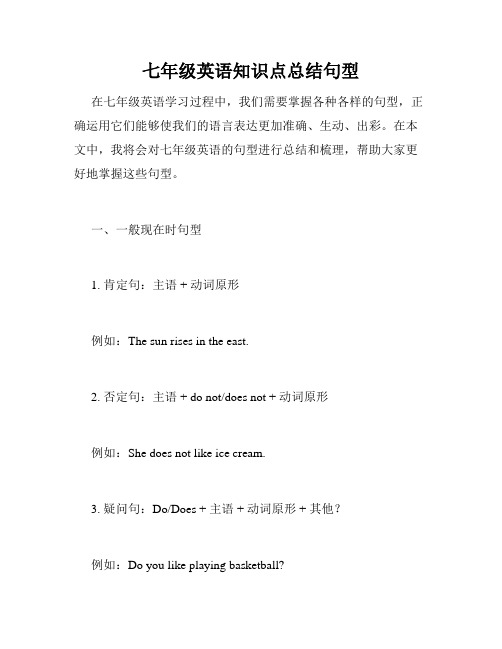
七年级英语知识点总结句型在七年级英语学习过程中,我们需要掌握各种各样的句型,正确运用它们能够使我们的语言表达更加准确、生动、出彩。
在本文中,我将会对七年级英语的句型进行总结和梳理,帮助大家更好地掌握这些句型。
一、一般现在时句型1. 肯定句:主语 + 动词原形例如:The sun rises in the east.2. 否定句:主语 + do not/does not + 动词原形例如:She does not like ice cream.3. 疑问句:Do/Does + 主语 + 动词原形 + 其他?例如:Do you like playing basketball?4. 特殊疑问句:疑问词 + do/does + 主语 + 动词原形 + 其他?例如:What does your mother do?二、一般过去时句型1. 肯定句:主语 + 动词过去式例如:I watched TV last night.2. 否定句:主语 + did not + 动词原形例如:He did not go to school yesterday.3. 疑问句:Did + 主语 + 动词原形 + 其他?例如:Did you have breakfast this morning?4. 特殊疑问句:疑问词 + did + 主语 + 动词原形 + 其他?例如:What did you do last weekend?三、现在进行时句型1. 肯定句:主语 + am/is/are + 现在分词例如:She is reading a book now.2. 否定句:主语 + am/is/are + not + 现在分词例如:They are not playing basketball at the moment.3. 疑问句:Am/Is/Are + 主语 + 现在分词 + 其他?例如:Are you watching TV now?4. 特殊疑问句:疑问词 + am/is/are + 主语 + 现在分词 + 其他?例如:What are you doing this afternoon?四、一般将来时句型1. 肯定句:主语 + will + 动词原形例如:I will visit my grandparents next Sunday.2. 否定句:主语 + will not + 动词原形例如:She will not come to the party tomorrow.3. 疑问句:Will + 主语 + 动词原形 + 其他?例如:Will you go shopping with me this weekend?4. 特殊疑问句:疑问词 + will + 主语 + 动词原形 + 其他?例如:Where will you go for vacation this year?五、情态动词句型1. can 用法:肯定句:主语 + can + 动词原形例如:I can swim very well.否定句:主语+ can not/can’t + 动词原形例如:She can't speak Chinese.疑问句:Can + 主语 + 动词原形 + 其他?例如:Can you help me with my homework?特殊疑问句:疑问词 + can + 主语 + 动词原形 + 其他?例如:What can you do for others?2. should 用法:肯定句:主语 + should + 动词原形例如:You should study hard for the exam.否定句:主语 + should not/shouldn't + 动词原形例如:He shouldn't eat too much junk food.疑问句:Should + 主语 + 动词原形 + 其他?例如:Should we visit the museum tomorrow?特殊疑问句:疑问词 + should + 主语 + 动词原形 + 其他?例如:What should I do to keep healthy?以上是七年级英语中常见的几种句型,希望大家能够认真学习,不断练习,掌握这些句型的用法,提高自己的语言表达能力。
七年级英语所有重点句型公式
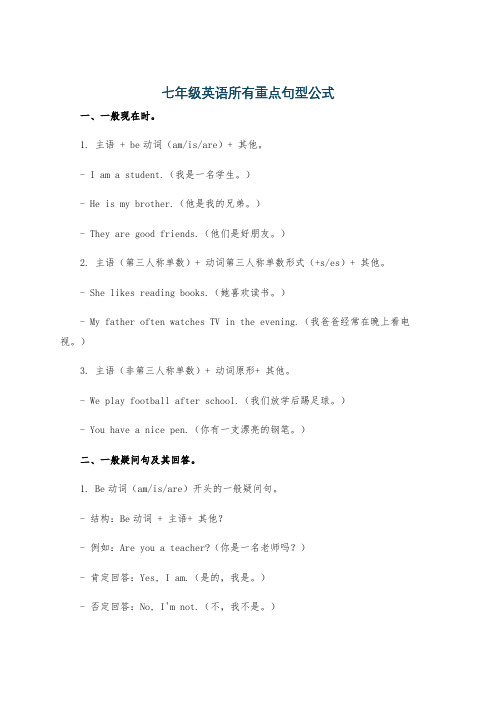
七年级英语所有重点句型公式一、一般现在时。
1. 主语 + be动词(am/is/are)+ 其他。
- I am a student.(我是一名学生。
)- He is my brother.(他是我的兄弟。
)- They are good friends.(他们是好朋友。
)2. 主语(第三人称单数)+ 动词第三人称单数形式(+s/es)+ 其他。
- She likes reading books.(她喜欢读书。
)- My father often watches TV in the evening.(我爸爸经常在晚上看电视。
)3. 主语(非第三人称单数)+ 动词原形+ 其他。
- We play football after school.(我们放学后踢足球。
)- You have a nice pen.(你有一支漂亮的钢笔。
)二、一般疑问句及其回答。
1. Be动词(am/is/are)开头的一般疑问句。
- 结构:Be动词 + 主语+ 其他?- 例如:Are you a teacher?(你是一名老师吗?)- 肯定回答:Yes, I am.(是的,我是。
)- 否定回答:No, I'm not.(不,我不是。
)- Is he at home?(他在家吗?)- 肯定回答:Yes, he is.(是的,他在。
)- 否定回答:No, he isn't.(不,他不在。
)2. 助动词(do/does)开头的一般疑问句(用于行为动词的一般现在时)- 结构:Do/Does+主语+动词原形+其他?- 例如:Do you like music?(你喜欢音乐吗?)- 肯定回答:Yes, I do.(是的,我喜欢。
)- 否定回答:No, I don't.(不,我不喜欢。
)- Does she go to school by bike?(她骑自行车去上学吗?)- 肯定回答:Yes, she does.(是的,她是。
- 1、下载文档前请自行甄别文档内容的完整性,平台不提供额外的编辑、内容补充、找答案等附加服务。
- 2、"仅部分预览"的文档,不可在线预览部分如存在完整性等问题,可反馈申请退款(可完整预览的文档不适用该条件!)。
- 3、如文档侵犯您的权益,请联系客服反馈,我们会尽快为您处理(人工客服工作时间:9:00-18:30)。
7B Unit 5 Amazing things87. Fish sleep with their eyes open.(with their eyes open部分是方式状语。
“状语”这个概念并不难,更不玄乎。
状语的主要功能是:说明动作如何发生。
此处,鱼儿如何sleep呢?眼睛是睁着的。
另外,此处的open 只能是形容词,如果是动词,它的“形”就是谓语动词的形式了,和eyes不“合”,因为eyes 是介词with的宾语,宾语后不能跟谓语动词。
另一个分析角度是:这里需要一个形容词来说明eyes的状态。
“眼睛闭着睡觉”怎么说?)88.The sun is 1,300,000 times larger than the Earth.(larger的er和than一起构成比较级句型)89.The fat and bones in the back of the person never stop growing from birth. (这个人背部的脂肪和骨头自从出生以来就不停地生长。
编写并熟读这样的句子有助于记忆单词。
Stop之后的grow为什么要用ing形式?你能从非谓语动词的角度来解释吗?)90. As usual, they sat down under a big tree.91. The strange man turned around suddenly and left the bush quickly.(这个怪人突然转身,并快速地离开了灌木丛。
熟读,记词,培养对副词做状语的感知。
)92.Andy stood beside the tree and listened carefully and heard the whisper. (listen和hear的区别)93. He wonders what will happen on his way home.(不能学过去时,又忘了现在时和将来时。
学了七年却记不住八种时态的根本原因是:没有有意识地复现学过的时态。
)94. Nobody replied, so he said to himself, “There isn’t anybody here. Everything is mine.”95. When the weak cat miaowed, it sounded like a whisper.(when引导的从句说明sounded发生的时间,这样的句子是时间状语从句。
)96. He picked up the cat and took it to the animal center with the surprised girls.97. Somebody ran away from the forest an hour ago.G: 一般过去时动词的形式变化及发音规律I: 98. I was surprised to know that there are only seven bone s in its neck.(框内的are是谓语动词的形式,所以,there are…部分必然是个句子,这个句子由连词that 引导,跟在动词know之后,做know的宾语,那么,that之后的句子就是宾语从句了。
另外,surprised是形容词,形容词之后跟不定式是常见搭配。
)99.Suzy will not be afraid of snakes any more.(该复习将来时了)100. Can he write with one hand and draw with the other at the same time? 101. Sandwich became popular all over the world later.102. By 2010, most families had at least one TV.103. Now TVs can be as large as 152 inches.短语:hear of, the other day, the day before yesterday7B Unit 6 Outdoor funW: 104. What outdoor activity would you like to try?105. Does Daniel like being outside?R: 106. She looked up and saw a white rabbit in a coat passing by. (look和see的区别;pass by 为什么用ing形式?)107. Alice stood up and ran across the field after the rabbit.108. She found herself alone in a long, low hall.109. Alice tried to go through the door.G: 一般过去时的句式变化I. 110. Do kites have a long history in China?111. People began to make “birds” out of wood over 2000 years ago.112. Remember to take your mobile phone. ( 动词开头,祈使句)113. It’s dangerous to swim in Xishuanghua Lake. (it是代词,代什么?为什么会出现这种结构?) T: 注意:虽然本部分材料的内容和难度都和reading一致,但不能像reading那样花时间,掌握下面的要点句足矣。
114. She opened the bottle and drank a little sweet water before she felt a little ill.115. Soon Alice was small enough to go through the door.116. Did she decide to enter the garden?117. She was too small to reach the key.118. She tried to climb up, but failed.短语:hurry up, get away, take a watch out of its pocket, let the rabbit get away, on the other side, put sth into…, put up a tent, from then on,必须掌握的过去式形式:become—became, forget—forgot, fall—fell, go—went,7B Unit 7 AbilitiesW: 119. Look out!(曾有人初到英国,听到楼上有人喊:Look out!,于是将头探出窗外“向外看”,此时,一盆脏水从天而降。
)120. Believe it or not.121. What can we do for the children in poor area?122. Some families are not even able to pay for pens and notebooks.123. They sent some clothes to them and raised some money for them. (复习一般过去时)R: 124. What a brave young man! = How brave the young man is!125. He was brave enough to save his neighbor from a fire.126. He heard someone calling for help and saw a lot of smoke from next door.127. He poured water over his clothes to protect himself.128. He was in hospital for two weeks because the fire burnt his arms badly. (注意不要把in hospital当成固定词组,在美国英语中,是可以说in the hospital的。
)129. How long was he in hospital?130. Were you afraid at the moment?131. We should be careful with fire because it is dangerous.G: 使用can、could、may;感叹句132. ---- By the way, can / could you take your camera with you? ---- No problem.I. 133. Is Suzy working hard on the subject this term? (该复习现在进行时了)134. She was careless and didn’t do her best last term.135. She will do better in the school team next term.136. Did he start to play the piano at the age of six?137. Can you show me how to play the violin? (特殊疑问词+不定式做宾语)T: 138. Dear sir, I would like to recommend Daniel for this year’s Young Star Award.139. Does he often take part in activities like collecting clothes for children in need?140. A 5-year-old boy lost his way and was crying in the street.141. We look forward to hearing from you soon.短语:put out the fire, do well in7B Unit 8 PetsW: 142. How rude Eddie is! (How brave the young man is! = What a brave young man!)143. What can you feed your rabbit? (feed其实不是生词,它是food的动词形式)R: 144. My dog is the cleverest animal of all. (clever用了最高级形式,这和of all相合)G: 形容词做定语和表语;someone/somebody/something、anyone/anybody/anything、no one/nobody/nothing等等,其本质是some和any及every、no的用法。
